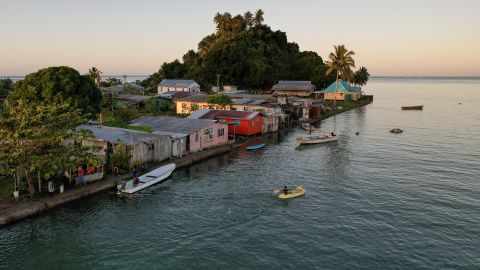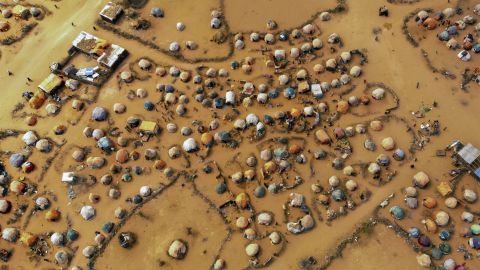[ad_1]
CNN
—
Aftab Khan felt helpless when torrential floodwaters submerged a third of Pakistan, his home country.
Khan’s hometown was completely underwater. His friend rescued a woman who had walked barefoot, carrying her sick child, through stagnant floodwaters for 15 miles. And Khan’s own mother, who now lives with him in Islamabad, was unable to travel home on washed-out roads to check if her daughter was safe.
“These are heart-wrenching stories, real stories,” Khan, an international climate change consultant, told CNN. “I was heartbroken.”
Pakistan became the clearest example this year of why some countries are fighting for a so-called “loss and damage” fund. The concept is that countries which have contributed the most to climate change with their planet-warming emissions should pay poorer countries to recover from the resulting disasters.
Earlier this year, Pakistan cooked under a deadly heat wave that climate change made 30 times more likely, according to the World Meteorological Organization. Now it is reeling from the aftermath of the worst floods in living memory.
The South Asian country is responsible for less than 1% of the world’s planet-warming emissions, but it is paying a heavy price. And there are many other countries like it around the world.
Loss and damage will be center stage at COP27 in Sharm el-Sheikh, Egypt, this year, as low-emitting countries inundated with floods or watching their islands sink into the ocean are demanding that developed, high-emissions countries pay up for this damage.
But it’s been a contentious issue for years, as rich countries like the United States fear that agreeing to a loss and damage fund could open them up to legal liability, and potential future lawsuits.
Climate activists in developing nations and a former top US climate official told CNN time is running out, pointing to Pakistan’s cascading disasters as the clearest evidence why a dedicated loss and damage fund is needed.
The developing world is “not prepared to protect themselves and adapt and be resilient” to climate disasters, former White House Climate Adviser Gina McCarthy told CNN. “It’s the responsibility of the developed world to support that effort. Commitments have been made but they’re not being delivered.”
As a concept, loss and damage is the idea that rich countries, having emitted the most planet-warming gases, should pay poorer countries who are now suffering from climate disasters they did not create.
Loss and damage is not a new ask. Developing countries and small island states have been pressing for these kinds of funds since 1991, when the Pacific island Vanuatu first proposed a plan for high-emitting countries to funnel money toward those impacted by sea level rise.

It took more than a decade for the proposal to gain momentum, even as much of Vanuatu and other small island Pacific nations are slowly disappearing.
In Fiji, climate activist Lavetanalagi Seru’s home island, it has cost an average of $1 million to relocate communities because of sea level rise. Moving away from ancestral lands is not an easy decision, but climate change is having irreversible impacts on the islands, said Seru, the regional policy coordinator with the Pacific Islands Climate Action Network.
“Climate change is threatening the very social fabrics of our Pacific communities,” Seru said. “This is why these funds are required. This is a matter of justice for many of the small island developing states and countries such as those in the Pacific.”
A major reason this type of fund is contentious is that wealthy nations are concerned that paying for such a fund could be seen as admission of liability, which may trigger legal battles. Developed nations like the US have pushed back on it in the past and are still tiptoeing around the issue.
Khan said he understands why rich developed nations are “dragging their feet.” But he added that it’s “very important for them to empathize and take responsibility.”
There has also been confusion about its definition – whether loss and damage is a form of liability, compensation or even reparations.
“‘Reparations’ is not a word or a term that has been used in this context,” US Climate Envoy John Kerry said on a recent call with reporters. He added: “We have always said that it is imperative for the developed world to help the developing world to deal with the impacts of climate.”

Kerry has committed to having a conversation on a fund this year ahead of a 2024 deadline to decide on what such a fund would look like. And US officials still have questions – whether it would come through an existing financial source like the Green Climate Fund, or an entirely new source.
Kerry also sparked some controversy on the topic at a recent New York Times event, when in response to a question on loss and damage, Kerry seemed to suggest that no country has enough money to help places like Pakistan recover from devastating climate disasters.
“You tell me the government in the world that has trillions of dollars, cause that’s what it costs,” Kerry said at the event.
But others say the money is there. It’s more a matter of priorities.
“Look at the annual defense budget of the developed countries. We can mobilize the money,” Alden Meyer, senior associate at E3G, told CNN. “It’s not a question of money being there. It’s a question of political will.”
At COP27, the biggest debate will be over whether to create a dedicated financial mechanism for loss and damage – in addition to existing climate finance meant to help countries adapt to climate change and transition to clean energy.
After climate-ravaged nations called for a new loss and damage finance facility at COP26 in Glasgow last year, it’s likely it will be an official COP27 agenda this year. But even as wealthier countries like the US and EU nations have committed to talk about it, there’s not a lot of hope countries will emerge from Sharm in agreement about a fund.
“Do we expect that we’ll have a fund by the end of the two weeks? I hope, I would love to – but we’ll see how parties deliver on that,” Egypt ambassador Mohamed Nasr, that country’s main climate negotiator, told reporters recently.
But Nasr also tamped down expectations, saying that if countries are still haggling over whether to even put loss and damage on the agenda, they’re unlikely to have a breakthrough on a financing mechanism.
He said it’s more likely that the loss and damage conversation will continue over the two weeks of Sharm, perhaps ending a framework established for a financing mechanism – or clarity on whether funds might come from new or existing sources.
Some officials from climate-vulnerable nations warned that if countries fail to come to an agreement now, the problem will be much worse later.
“For countries not on the front line, they think it’s sort of a distraction and that people should focus on mitigation,” Avinash Persaud, special envoy to Barbados Prime Minister Mia Mottley, told CNN. “If we had done mitigation early enough, we wouldn’t have to adapt and if we’d adapted early enough, we wouldn’t have the loss of damage. But we haven’t done those things.”
Correction: An earlier version of this story misstated how much money has been spent to relocate communities in Fiji because of sea level rise. It’s an average of $1 million per community, according to Lavetanalagi Seru.
Source link



